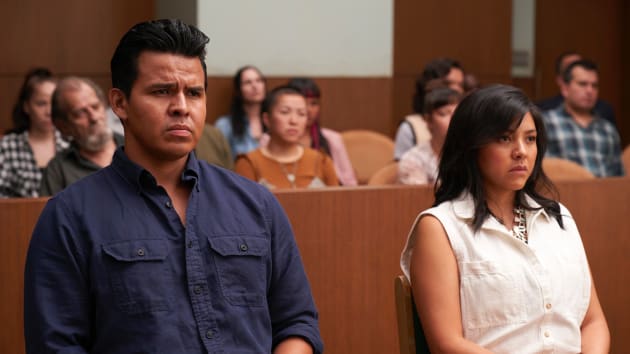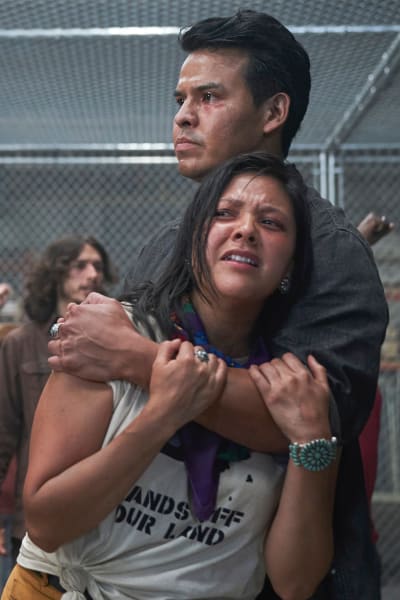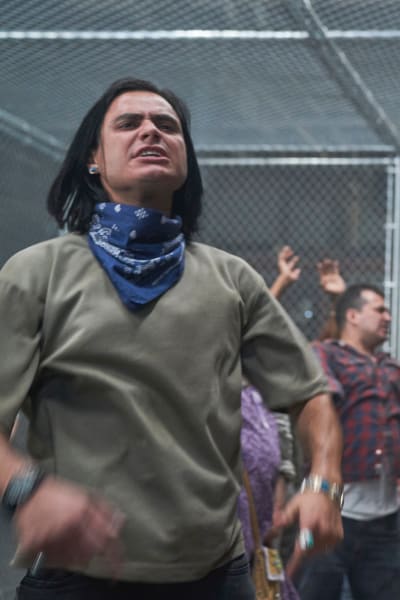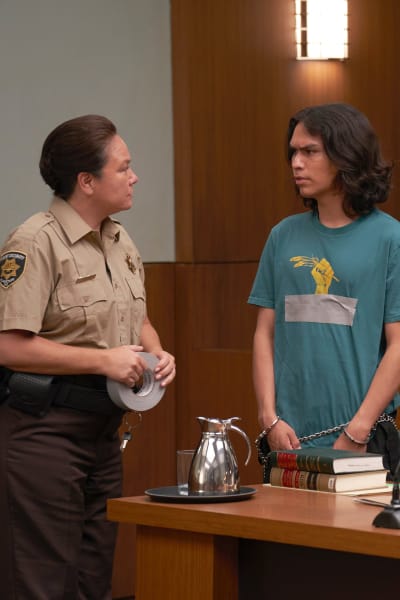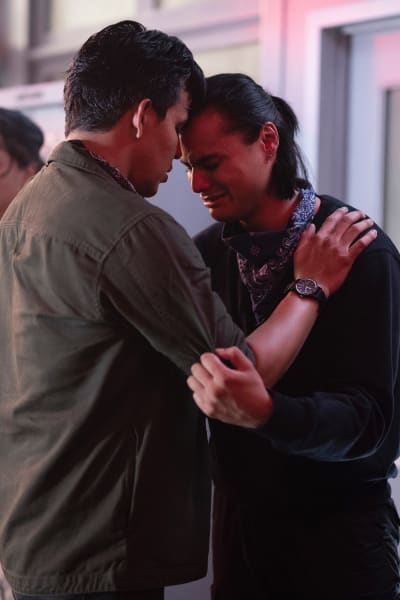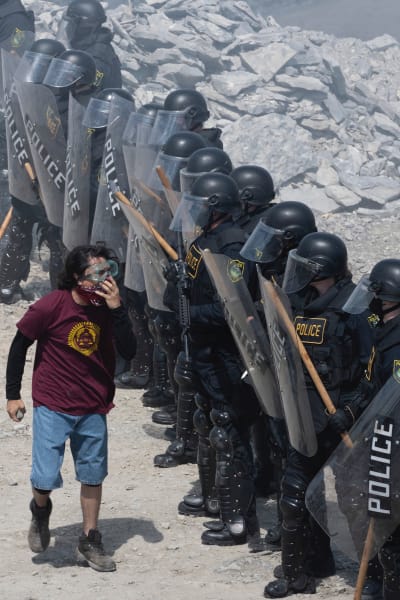This Accused episode will correct that wrong if you have never felt the searing awareness of the injustice against Indigenous people.
The family unit extends past their household into the tribe, with loyalties tested left and right.
Accused Season 3 Episode 6 takes the viewers deep into the Navajo culture by looking at the social inequity they experience and their deep love and familial bonds.
The episode highlights a leader, Naataanii, who is a just man. He is a profoundly passionate advocate who values progress and peace. His sense of pride is only surpassed by his sense of responsibility for the safety of his people.
Naataanii is met with brutality and vicious police tactics, even as he approaches the situation nonviolently. After the protests against uranium mining turn violent, he and his sister are detained like dogs in a kennel with dozens of their tribe members.
Their fears and righteous indignation remain unheard. We meet Chase, a seeming hothead fighting to avenge his sister’s illness. The mines have been making their people sick, and he had a first-row seat to watch his otherwise healthy sister deteriorate.
While the powers that be may find Uranium mining a beneficial and productive source for the Navajo, the truth is that it hurts them more than any financial benefit could ever justify. Again, their cries remain unheard.
It makes sense now why you came back. Sure as hell wasn’t to help your people.
Shandiin
Chase and Naataanii symbolize two differing perspectives of how Native Americans — the calm, peaceful, and resilient archetype vs. the angry, vengeful warrior. But even as wild as Chase seemed, his anger was justified.
He was young, and the world created to protect him seemingly hated him. Over and over, the show displayed the extreme levels of oppression in their community. The disregard that the judge felt for their language and culture was apparent.
Words were cruel, and their actions were callous. And it was heartbreaking to watch. So, it makes sense that they would resort to extreme measures. We saw Naataanii go from calm to desperate as he sought answers for the heinous situation.
In the Accused series, there has been an ongoing theme of the protagonist believing that they alone can solve the issues their loved ones are facing. This episode is no exception. Although Naataanii continually referenced the Tribal Council, he ultimately went along with a plan contrary to his character –another constant theme of Accused.
Derek: I was in prison 3 months and I couldn’t take it. I would have died there.
Naataanii: And where do you think we’re all gonna go now?
Although this episode did not feature an apparent mental health issue, it showed that oppression devastates people. Taking their voices causes them to scream in any way imaginable.
And though Naataanii went through the most significant transformation in this episode, it was about so much more than just him. His sister, Shandiin, suffered heartbreak as the man she had once loved turned out to be a selfish liar.
Her love for Derek was evident in every interaction. And even though she was hurt that he left, you could see hope in her eyes because he had returned.
She hoped that somehow his loyalty to their tribe and his love for her would far outweigh the perceived glamour of the outside world.
His betrayal cut to the bone, but feelings were still fresh. When Derek was shot and killed, she was destroyed.
Her vulnerability and ability to sway her brother shifted and guided the plot’s direction. Her emotional pleas persuaded Naataanii more than anything.
Did you forget your land? You’re Dine’. All of us! We’re all Dine’. Your umbilical cord and my umbilical cord… our umbilical cord is buried here. We’re the reason you have a place to even come back to. And you set us up.
Shandiin
So, as they stood trial, her level of guilt was overwhelming. Had she listened to her brother, Derek would still be alive, and so would the hope of their reconciliation. Her passionate appeals to Derek and Naataanii were eloquently written and passionately acted.
As you watch it, Chase seems like he could ignite at any moment. He looks like the character with the least to lose, but somehow, Naataanii ends up with the gun.
Chase begs for Derek’s murder, but deep within, we know it’s not his character to kill someone. Chase wants retribution but not at the expense of someone’s life.
Naataanii: Chase, you just need to be patient.
Chase: I’m tired of being patient. While you’re printing your t-shirts, writing your Facebooks, and moonlighting for Tribal Council, I’ll be riding into battle.
To be young and passionate and still not seen or heard is frustrating. The judge attempted to muzzle Chase at every turn. His disdain for the Indigenous bailiff was apparent because his pride in his culture is the root of his identity.
The bailiff was in a difficult position. These were her people. She could try to speak up, as the lawyer did countless times, or keep her job. She witnessed the cruel and abusive treatment the defendants endured by the judge. And, like so many other times in this episode, she had no voice to use.
Naataanii was not quite an antihero or a hero — he was just a man who wanted to be heard. His continual attempts at changing the cultural dynamics in their community were ineffective, so he yielded to Derek’s ill-fated plan.
Derek, taking a deal offered to him by a dirty cop, hurt everyone he held dear. The guilt ate him alive, and in proper Accused form, we saw his torment. He did not want to proceed with the plan, but FBI Agent’s manipulation was enough to get him to move forward.
Chase: What are you doing?
Naataanii: Killing him… would be letting him off too easy. Your punishment is to make things right.
His redeeming moment came when Naataanii chose grace over destruction. He spares his life, and Derek loses it moments later through a cruel twist. Naataanii’s embrace put the pain and shame of betraying his tribe to rest permanently.
Accused tells the stories from the perspective of the defendants. Often, the viewpoints of oppressed people are perceived as biased. Accused exposes the chips on the shoulders of hurt people, but it also reveals the root and result of those chips.
White man’s justice. It’s a bitch, right?
FBI Agent
We see why these people are hurt, and we understand their fight. In this case, this episode was a clear win — not just because they were vindicated, but because it spread awareness of the mistreatment and abuse of Native Americans in this country.
Maybe this episode will light a fire of conviction in someone’s heart. Because even though this fictional ending was positive, there are still voiceless people fighting a real fight.
What were your thoughts on the episode?
Did the bailiff redeem herself with the recording?
Was it actually a happy ending?
Drop your thoughts in the comments.
Brandi Powell is a staff writer for TV Fanatic. Follow her on Twitter.
